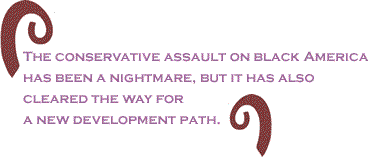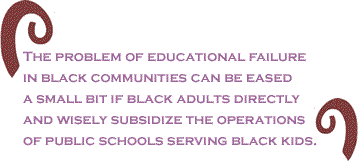
|
|||||||||||||||||||||
|
I. Our Blues as the Seeds of the Next Black Rebellion Black America has spent the past quarter century on the defensive against the conservative assault on equality – especially racial equality – inaugurated by the election of Ronald Reagan. The right’s program of reverse Robin Hood economics and smashing the limited instruments of fairness fashioned by liberalism between the end of World War Two and 1980 has been a brilliant political success that has deeply wounded black people. Conservatives have reconstructed the system of racial inequality in the US by moving away from the racial police state of the Jim Crow era to a free market strategy of economic abandonment and incarceration. Under the new racial dispensation authored by the Republicans under Reagan and the Bush family, with the approval of the Democrats under the aegis of the Clinton family, blacks can vote – sometimes – own property, make money, and even marry across any and all color lines. What blacks cannot do is enlist the help of government in dismantling the barriers to economic and social equality that the toxic mix of free markets and petty racial hatreds throw in our way. But, strange as this may sound, black America may now be strong enough to fashion an economic model of development and justice based on a new mixture of self-reliance and limited progressive politics. The conservative assault on black America has been a nightmare, but it has also cleared the way for a new development path, if we have the courage and patience to take it. Before outlining this potentially fruitful approach, we must understand how conservatism rebuilt American racism after the demise of Jim Crow. The Republicans have replaced the weak supports for equal opportunity erected by the liberals in the 1960’s and early 1970’s with nearly laissez-faire capitalism in which needs are met on the basis of free choice and the ability to pay. Aside from the relatively few public goods that even conservatives see as indispensable – like national defense, a court system, the police, prisons and infrastructure like roads, bridges and airports – ours is an economy where you get what you can pay for. Need health care? Buy it. Don’t have enough money? Go to an overburdened public hospital (which will eventually disappear once taxes are cut enough) and hope for the best. Kids need good schools? Move to a neighborhood that has them. Can’t do that because the people in the area have more money than you and would not sell to you anyway since you are black? Tough, live with it nigger.
Laws against job, housing and mortgage discrimination are still on the books – for now – but they are not enforced with any conviction. Affirmative action has not been killed off – yet – but so many of our kids are badly schooled that they are not ready to succeed even if they do get into college. Racial decorum demands that conservatives not move against black people by reinstating Jim Crow because that would upset middle class white people – such is the limited political utility of soccer moms. Discrimination in the marketplace is perfectly acceptable to the conservatives, even though racist choices erect sturdy barriers to black development by depriving us of the goods we need to develop and compete, because the rights of private property and unfettered choice matter more than the deprivation caused thereby. Racial separation and hierarchy are now sustained by a pungent mix of petty racism and competitive capitalism that systematically withholds knowledge, health care, housing and credit from black people, thereby locking a substantial number of us into the nation’s economic basement without the need for government to use police dogs, cudgels, prisons or men with white hoods. Despite this bleak situation, black America has managed to build skills and wealth in the face of a vicious and determined conservative assault. We have met the blows of our right wing nemeses by doing what we do best: forging ahead in the face of adversity with that special calm display of strength and seriousness of purpose. According to the Census Bureau, the high school graduation gap between whites and blacks has virtually disappeared since 1980. In 1980, 17.8 percent of whites over twenty five held college degrees compared to 7.9 percent of their black counterparts; in 2004, the percent of blacks holding college degree rose to 17.6 compared to 28.2 for whites. Yes, there is still a gap, but it is closing even in the face of conservative racial animus. Blacks in 1980 earned about 59 cents for each dollar earned by whites; in 2004 we earn about 69 cents for every dollar earned by whites. This last bit of data must be handled with care: the collapse of wages for modestly educated workers in this country – those with only a high school education or less – accounts for much of the lack of progress in closing the black/white earnings gap. Global competition, technological change, the collapse of unions and the resulting shifting of job opportunities away from modestly schooled workers to highly educated workers has occurred faster than we have been able to adapt. Free market racism limits black access to crucial developmental resources, especially education, thereby slowing down our capacity to adjust to the new economic realities, including the collapse of the blue-collar road to the middle class. Yet, there is a way for black Americans to increase our access to some developmental resources through a potent mixture of self-help and crafty progressive politics which can withstand conservative pressure and, with a little luck, become the basis for a sturdy, though perhaps limited, economic development and justice coalition across the black/brown color line. (It is, perhaps, too much to hope that a substantial portion of whites would join a multiracial – really, post-racial – coalition in favor of real equality for all in the face of the brilliant politics of hatred practiced by the right. I hope my pessimism on this score is excessive rather than accurate.) II. Economic Development in Black I will use the problem of schools to develop a few core principles that can guide a viable development program of progressive self-reliance for black America.
Too many black children, whether in urban, suburban or rural school districts, are offered substandard schooling in decaying facilities with overcrowded classrooms, overburdened and underpaid teachers – many under-qualified or teaching out of their fields of expertise – in localities trapped in the downward spiral of economic decline made worse by the high taxes required to finance failing schools. This is where free market racism bites hardest: public schools serving poor communities do not have the resources to compete for the best teachers on the basis of pay, perquisites or working conditions, nor do they have the means to repair, rebuild and update their facilities – classrooms, libraries, laboratories, bathrooms, heating and air conditioning systems or safety measures – to create an appealing environment for faculty or students. Yet, the conservative ban against redistribution that traps black kids in failing schools – which cannot possibly be addressed by the stingy and silly voucher proposals currently peddled as miracle cures by policy charlatans – can be defeated if black America replaces ever stingier redistribution from outside with subsidies from the inside i.e. if black American adults choose to reduce our consumption in the interest of supplementing the educational resources available to our kids. I am suggesting that the problem of educational failure in black communities – a complicated situation with many causes and no easy solution – can be eased a small bit if black adults directly and wisely subsidize the operations of public schools serving black kids through a particular kind of non-profit enterprise – an education development fund (EDF). These subsidies could be used to (1) supplement teacher pay, both by boosting the average level of pay for all teachers and by funding a bonus system for exceptional performance by teachers and other school personnel, (2) provide financial incentives for teachers with specialized skills – particularly teachers with advanced training in mathematics as well as scientific and technical skills and the arts – to work in black schools, (3) create endowments for sustaining and updating important school facilities like libraries among other activities. A system of private subsidies financed by black adults (as well as non-blacks who do not think that “black intelligence” is an oxymoron) attempts to increase the ability of black schools to compete for the most important educational resources – particularly good teachers – while increasing the leverage that black adults have over the process of schooling. In addition, the system of subsidies attempts to inject a substantial element of competition for excellence within the schooling process by rewarding achievement in ways that enhance cooperation between black communities and schools in setting goals, evaluating performance and adapting to changing conditions. This system of subsidies is not to replace public funding of public schools, nor to create a de facto set of private schools for black kids. The democratic institution of the common school is to be protected, but enhanced, in communities where severe budget restrictions combined with conservative hostility to redistribution puts black schools at a disadvantage in the competition for top quality talent and for other crucial resources. The majority of school operations would still be financed in the usual manner – through taxes of various sorts as well as help from richer communities via federal and state government when the conservatives are finally dispatched. However, the education development funds would, over time, increase the ability of communities to support academic excellence. Consider the example of a superb teacher who is committed to the idea of social justice by doing his or her best in the classroom, but who must also pay bills and send their own kids to good schools. He or she is mulling offers to teach in a wealthy suburban district that offers high pay, excellent working conditions and pleasant surroundings while teaching children from highly educated families in a community full of like families, or in city schools with none of these advantages. Our teacher is still torn between doing well by his or her family or serving social justice, but the harsh reality of doing right by one’s own kids wins out. Now suppose that the education development bank in the city offers to fill the gap between the city and suburban offer, or, if need be, to add other inducements that tip the balance in favor of teaching in the city. For instance, the suburban school may offer a salary of $50,000 and benefits while the city only offers $45,000, again with benefits. But the education development bank then offers to add $8,000 to a teacher’s salary and, on top of that, to contribute $2,500 a year to a college fund for the teacher’s young children in a designated 529 account – a tax free college saving plan program available to everyone in this country but used mainly by higher income families. Many teachers in this position might still take the suburban job because they do not want to teach black kids, but that’s fine since we don’t want them around anyway. But lots of teachers on the fence – and I suspect that there are quite of few of them of all colors – will opt to teach in the city for a few years, and maybe longer than that because the subsidy tipped the balance. Note that the subsidy, in this case $10,500 a year, is far less than the $45,000 salary paid by the city school district. Governments will still pay the base salary and benefits of teachers, which are not enough to attract higher quality labor. However, the subsidy can, if designed in the right way, combat the educational consequences of free market racism by gently tilting the flow of educational resources in the direction of black kids. III. The Limits of Self-Reliance
This may all seem quite dreamy and irrelevant, especially since this scheme is based on voluntary contributions in the absence of government power to force most people – particularly the well to do – to contribute to the well-being of other people’s kids. Where on earth will the money for this come from? Suppose that, each year, ten million black adults give $400 each – $33.34 per month per person, or a little more than $1 a day – to a Freedom School Fund for the purpose of creating a system of private subsidies. Four billion dollars a year, every year, going into a fund for providing subsidies to people who teach black children. One half of the contributions would add to an endowment that paid teachers out of the income earned through careful financial management by the best managers available – two billion dollars a year is an attractive pool of money for talented financial professionals to work with – with the rest of each yearly contribution being paid directly to teachers. If the fund began operations in 2008, and earned a modest five percent rate of return per year, after inflation and fees for fund managers, with four percent going to pay teacher subsidies and the remaining one percent retained for growth, then the Freedom School Fund would grow to $23.13 billion by 2018, with $2.95 billion paid out in teacher subsidies. If these payments are dispersed among 250,000 teachers across the US, then each teacher would receive a subsidy of $11,701, after accounting for inflation. By 2038, the fund would grow to $72.26 billion with $4.89 billion available to pay teachers. Let’s continue with the example of a city school district considered above to show why a system of private subsidies is quite practical, and radical, on a smaller scale. Suppose the city’s employs 5,000 teachers and serves 150,000 students, 100,000 of whom are black and 50,000 of whom are in terrible schools. The city has 500,000 residents, seventy percent of whom are black, with a high black adult poverty rate in the neighborhood of thirty percent. If ten percent of the black population, 35,000 adults, put aside one dollar a day in a City Freedom School Fund, then they will contribute $12,775,000 to the fund each year. If the City Freedom School Fund is operated along the same lines as the national fund considered in the foregoing paragraph, then it would grow to $73.88 million after ten years while generating $4.95 million in potential subsidies. This does not seem like very much money until you realize that the fund would disperse the subsidies on a targeted basis, in light of careful analysis of the most effective ways to alter incentives or finance changes to generated the greatest bang for the buck. Four million dollars is more than enough money to begin attracting specialized talent as well as financing particular building projects that improve academic performance in a small city. After thirty years, the fund would grow to over $230 million while paying out more than $11 million in subsidies. Of course, there would be lots of political and other troubles if such a system were to develop. First, conservative political forces would be sorely tempted to cut funding to black schools on the theory that those otherwise shiftless Negroes had, for some reason, found a way to raise money for themselves. This could be easily countered by legal and political strategies that insist on non-discrimination on the basis of race, trapping the right in its own color-blind rhetoric. Second, this approach offers a direct challenge to many teachers’ unions, which might oppose a subsidy scheme on the claim that all of their teachers work hard and deserve the subsidy. The counter to this is that the subsidy scheme is based on the principles of need and merit – where need is defined in terms of what is in the academic interests of the kids and merit is defined by those practices that lead to the best results. There is no reason why the community and the teachers cannot get together to administer the fund – though the teachers would be junior partners in the enterprise – thereby creating a common interest in spending money wisely. Third, the locus of black politics would subtly shift from electoral office to the creation and management of non-governmental institutions with the resources and power to alter the use of wealth in society. The Democrats and Republicans, and hopefully less reactionary new parties, would soon find themselves in the position of fighting over which party could best aid the efforts of black communities to improve their schools, since we would no longer simply be beggars asking someone else to help us teach our kids. We would have wealth that commands the attention of important groups – like teachers – who would have an interest in backing those parties which support policies and funding schemes that improved black schools. The funds would be strictly non-partisan on pain of losing their tax exempt status, thereby forcing the politicians to serve black communities and not vice versa.
Also, black politics would soon focus on how the funds were managed, who ran the organizations, and what they did with these precious resources. However, the only way the funds can sustain themselves is if they perform – else the public would soon use their $1 a day for something else – thereby giving the public ultimate veto power concentrated in the black community. Ideally, we would have competition between a limited number of funds that reflected the real diversity among black Americans, thereby expanding the options of using subsidies in the interests of black children and their parents. IV. Return of Frederick Douglas and Malcolm X All of this from contributions of $1 a day by a smallish portion of the black public. Can this sort of scheme work? I do not know. I do know that we are now able to build institutions that can, with time, greatly alter the social landscape without Herculean effort, but we must be far-sighted enough to put in some effort, and vigilant enough to protect new institutions once established. Similar structures could be developed to finance black candidates for office, or progressive investment banks aimed at financing small business or non-profit organizations in black communities. We are now in a Frederick Douglas/Malcolm X moment, and we have no excuse if we fail to act on this opportunity. Douglas told America that it was obliged to free us from bondage if it was to live up to its principles. Malcolm X told us that we must stand on our own two feet and stop depending on those whites whose hatred of us seems to know no bounds. The conservatives now in power surely hate us, and have decided to leave us alone, perhaps in the hope that we will wither away quietly, or in jail, since they truly believe we are apes. We have it in our power to slowly, but surely, rearrange the economy and politics of the US by creating new institutions. The subsidy system described above is one among many new approaches that should be explored, and soon. We can’t waste much more time hoping that conservatives will turn into moral people – they will not and cannot – or that the liberals grow a new spine. Once again, we are on our own. Marcellus Andrews is an economist and senior research fellow at the New America Foundation. Dr. Andrews writes on economic policy and economic justice for academic and popular audiences, including The Political Economy of Hope and Fear: Capitalism and the Black Condition in America (1999, NYU Press) and Universal Capitalism and the Quest for Economic Justice (forthcoming). Dr. Andrews received a PhD in economics from Yale University and has taught economics at Wellesley College as well as the City University of New York. |
Your comments are always welcome. Visit the Contact Us page to send e-Mail or Feedback or Click here to send e-Mail to [email protected] e-Mail re-print notice
If you send us an e-Mail message we may publish all or part of it, unless you tell us it is not for publication. You may also request that we withhold your name. Thank you very much for your readership. |
| July 21 2005 Issue 147 |
|
| - |
| Printer Friendly Version |
 |
 |
| |
| |





























